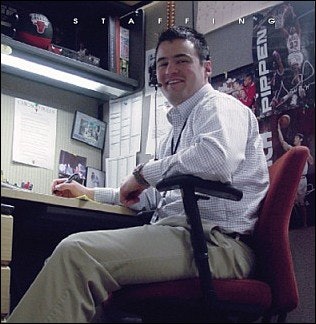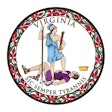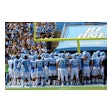More than just a means of securing cost-effective help, establishing an internship program takes resources and a fair amount of work

In many ways, the Chicago Bulls treat each of their 14 sales interns like any other employee: They receive initial and ongoing training, bonuses when applicable, invitations to company functions and complimentary tickets to every home game. In return, the interns are expected to perform like any other employee.
Seth Roberts, who graduated from Bowling Green State University with a 15-credit Bulls internship before sticking around for a second, admits to being somewhat awed when he first arrived on the doorstep of Chicago's United Center, with its statue of Michael Jordan gracing the exterior plaza and its game-day energy within.
After all, the prestige of professional sports is what led Roberts to renege on an internship commitment in the University of Toledo's athletic department. But that decision ultimately hinged most heavily on Roberts' desire to gain practical work experience.
"The thing that most attracted me was the actual job itself," he says. "Obviously, they're all going to be entry-level positions, but it wasn't going to be like, 'Oh, you're the intern. Here. Go copy this.' They were actually going to throw me into the thick of things, let me do it and help me out at the same time."
"It's really all about the substance of the experience, which is what we try to insist upon with our interns," says Anita Moorman, associate professor in sports administration at the University of Louisville, which requires a 400hour internship from those students seeking a degree in the field. "And really, it's probably the greatest challenge for the sponsoring organization. It takes a lot of time to supervise interns, to find things that they can work on with flexible schedules and sometimes varying degrees of commitment. It can be a real burden if the organization is not prepared to do that."
Internships range in length from a few hundred hours to a full year. Walt Disney World's Sports and Recreation Division, which includes its Wide World of Sports property as well as water parks and golf courses, offers the 12-month variety. It is considered one of the most highly structured internships available, with up to a month of orientation followed by monthly intern meetings featuring guest speakers and classes covering such topics as one-on-one interviews, panel interviews and résumé building. A class currently under development will focus on business etiquette.
"A lot of places, especially places that have never had an intern before, don't understand the amount of resources that have to go into orienting the intern to not only that workplace but to the career field in general," says Jackie Cuneen, chair of the sport management, recreation and tourism division at Bowling Green State, which has seen its share of students serve Disney internships. "They're not free labor. They are students there to learn. And these people really need to understand that they are more or less an extension of the university's faculty when they agree to take on an intern, because they need to teach them things."
It can be daunting, unless proper measures are in place. "It's very important to have an idea of what the interns are going to be doing the entire stay with you. They may come in to fulfill a very specific need - a research project, for example - but you have to make sure that that's not the only thing. You want to make sure that you're providing them with opportunities to utilize all their talents," says Kari Samora, internship director for Disney Sports and Recreation. "You don't want your interns to be bored. So prepare a complete training guide of the entire length of time that they'll be with you, before they even arrive."
Adds Moorman, "Don't just look around and realize that you're swamped and need help. Rather, think about all the tasks that are being performed in your organization, all the projects that you're responsible for, and where someone with mostly just a passion and a little bit of experience can contribute."
A common incentive cited for bringing interns on board is the very real impact they can have on an organization's bottom line. "The most obvious - and probably the most criticized - is that internships represent cheap labor. Many interns will work for free," says Moorman, who has authored internship-related articles appearing this year in the Journal of Physical Education, Recreation, and Dance. "But another thing that tends to be very advantageous is the ability to sort of demo a potential employee. While there's no guarantee of employment, clearly it gives both the intern and the organization a chance to see if they're going to be a good fit."
Moorman cites three characteristics of a mutually beneficial internship. "The intern supervisor needs to embrace his or her role as a mentor. If he or she is not really into the basic notions of why interns are there, and that is to learn and to grow professionally, it's not going to be the best situation," she says. "The second thing is having substantive projects to work on so the interns can make meaningful contributions. Everybody has to make copies and get copies, and our students understand that if on Tuesdays they're asked to make copies all day, just make sure that they make copies better than anybody's ever done before. The third thing is duration. It's very important that the intern is there long enough to really learn something, and for the organization to have a good feel for the intern's different qualities, including leadership, communication skills and work ethic."
Organizations looking to launch an internship program are best served by first consulting with the internship coordinator at their closest college or university. Ideally, that school offers a sport management program approved by the National Association of Sport and Physical Education/North American Society for Sport Management or, if applicable to the internship, a recreation program accredited by the National Recreation and Park Association/American Association for Leisure and Recreation.
Not only will the academic institution provide valuable guidance as to how to structure the internship, it may well serve as a trusted source for interns. Deciding which individuals will join the organization, albeit temporarily, requires the same scrutiny as if they were being hired permanently. The National Basketball Association, for example, screens the reams of résumés the league office receives each year before inviting select individuals to attend an annual job fair. There, individual NBA franchises conduct face-to-face interviews with aspiring interns and employees. Disney, meanwhile, receives thousands of internship inquiries each year, and thus relies almost exclusively on institutional recommendations and phone interviews.
In any case, due diligence early can save time and effort later. "If they interview the intern the way they would interview somebody for a full-time job, they're not going to get a student who has to have his or her hand held," Cuneen says. "It takes skill to interview an intern, just like it takes skill to interview an employee."
Once interns have been chosen, it is advised that the sponsoring organization, the intern supervisor and the intern sign off on a written agreement regarding the internship's duration, the responsibilities of all parties involved, and the intern's compensation in terms of wages or academic credit (or both). Clauses may be included to cover transportation, intellectual property and legal issues, such as whether the sponsoring organization will be held liable for injuries sustained by the intern during the internship. Most often, the intern is treated in the same manner legally as any at-will employee, with the possible exception of compensation.
Organizations able to classify interns as trainees are exempt from paying them wages under the Fair Labor Standards Act. In designating trainees, the Department of Labor applies these six criteria:
• The intern cannot displace a regular employee position • The intern cannot be guaranteed employment at the end of the internship • Both the sponsoring organization and the intern must know that the intern is not entitled to any wages during the internship • The intern must receive training from the sponsoring organization, even if it takes time away from work • Training must be hands-on experience with equipment and processes used in the industry • The training must primarily benefit the student, not the sponsoring organization.
"Critics claim that well over half of the internships in sport organizations aren't really entitled to the exemption, and that the organizations should probably be paying minimum wage," Moorman says. "My recommendation is that the organization should first consider a minimum wage structure, which doesn't cost that much, or use a stipend program. There's some way to provide some sort of compensation if they're really displacing an employee."
Beyond the nuts-and-bolts internship agreement, a learning contract can be drawn up to outline the intern's educational goals. "Then the organization can line up the activities that the intern is going to be doing, and ensure that they make sense in terms of the learning goals," says Fred Sweitzer, director of human services at the University of Hartford and author of The Successful Internship: Transformation and Empowerment in Experiential Learning.
The learning contract may even require some negotiation between parties, adds Sweitzer. For example, an intern may state that he or she wants to make a pitch to a prospective corporate sponsor, while the organization may reserve assignment of those duties to experienced professionals. A compromise in that case may involve the intern accompanying the professional during a sponsorship proposal or writing a mock proposal that the professional critiques. "The point is, you need to do something to help that student learn what he or she wants to learn," Sweitzer says.
Throughout the internship, sponsoring organizations must also remain aware that interns answer to more than one entity during their stay. It's not an uncommon requirement for interns to submit to their campus internship supervisor quarterly or more frequent reports detailing their experiences relative to their learning goals, including projects completed, skills used and personal improvements that still need to be made. These exchanges may take place on paper, via e-mail or over the phone.
In addition, the intern may be required to complete a major project while with the organization. Knowing that the Chicago Bulls have been forced to pay greater attention to group sales in the post-Jordan era, Roberts sought and received permission to research group sales strategies among professional sports franchises with the greatest ticket inventory of all - those in Major League Baseball. That experience entailed speaking with as many teams as Roberts could reach (23 of the league's 30, it turned out), filling in remaining blanks by visiting team web sites, compiling a 100-pluspage report and then breaking it all down for Bulls ticket officials during a presentation delivered in December. "I identified five key points that I thought were things that could be beneficial," Roberts says, adding that the Bulls may begin implementing some of the strategies next season.
Such action would be the ultimate endorsement of Roberts' efforts, but most sponsoring organizations will also likely be expected to provide the school written evaluations of the intern's performance (perhaps at the midpoint of the internship and at its conclusion). If the sponsoring organization is close enough to the school (say, within a three-hour driving radius), the organization can also expect at least one routine site visit by the school's internship supervisor.
Many internships are set up between schools and organizations sharing an established history of expectations, and rarely does the internship require tweaking along the way. However, that may not be the case for organizations welcoming interns into the workplace for the first time. "We don't mind if they're overworked, as long as it's not excessive, but we mind a lot if they're underworked," says Cuneen. "And we mind a lot if they're not exposed to genuine experiences. We want them working closely with the professional in practice."
Mentoring is key. Some sponsoring organizations, including Disney, go so far as to assign mentors to individual interns. "They enter the internship as students. They leave as good practicing professionals. And they don't get that way without somebody mentoring them," Cuneen says.
In addition to providing professional guidance, mentors must also remain sensitive to the different emotions interns are likely to experience over the course of their stay. "I'm not talking about turning supervision time into a therapy session," says Sweitzer, who says nervousness at the internship's outset is common, even expected, but seldom confronted. "It can be something as simple as asking the intern, 'What are the five things you're most looking forward to?' and 'What are the five things you're most concerned about?' Or, if you have a group of interns, have them write their concerns anonymously on pieces of paper, put them in a box and then take them out and read them. Interns get to hear that they share a lot of concerns."
Once the internship is under way, interns may begin to regret the field they've chosen or feel that the experience is falling short of expectations, though rarely will they express such feelings. "Make sure that if interns feel like things aren't going the way they want them to go, that they can say so and not worry that they're going to be punished as a result," Sweitzer says.
Anxiety may return as the internship nears its end, and the real job hunt looms. This may manifest itself in behavioral defense mechanisms, such as arriving late or being outwardly cantankerous, according to Sweitzer. "It's a lot easier to say goodbye to an experience if you decide it wasn't that great after all," he says. "Interns find ways emotionally to distance themselves from the pain, the insecurity, or just the sadness."
To combat such occurrences, Sweitzer recommends that the sponsoring organization signal the pending separation weeks in advance by asking the following questions: "How does it feel for the end to be coming up." "Who would you like to speak with before you go." "What projects are you working on, and to whom are you going to hand them off?"
Exit interviews should be conducted, ideally weeks after the internship has concluded, says Sweitzer, who suggests inviting the intern back for a post-internship lunch as a means to receive the most candid feedback. "We take it for granted that somewhere along the line, students are going to get an assessment of their strengths and areas still needing development as they're exiting the internship, but we don't always open the door for information to come the other way."
Clearly, internships may involve a great deal of physical, financial, even emotional investment from all parties involved, but those parties can all share in the payoff, as well. "The overarching issue is that an internship is supposed to be a learning experience, not a job, and that there's a certain amount of time and energy devoted to it." Sweitzer says. "That's something that's easily misunderstood."
For the most sought-after internships, the level of prestige often trumps the size of the paycheck. Roberts is lucky to be earning both with the Bulls. In addition to the aforementioned perks, the Bulls provide their sales interns a daily lunch and minimum wage (that is, unless their sales commissions exceed normal wages, in which case they pocket the commissions only). But it's still not enough to live on in Chicago, says Roberts, who receives financial assistance from his parents.
"The student needs to understand that some of these costs are front-loaded," Cuneen says. "If you complete an internship at a great company and it costs you money to go to that city and live there, even if you're not getting paid, it's still an investment in yourself, because it sets you up to get a great job."
Roberts understands. In fact, he even volunteers his time whenever possible on the game-management side of the Bulls operation, serving as a liaison between youth groups and the players who purchase tickets for them. "Just being able to be down there, talking with the players - you can't put a price on it. It's an experience that I'm very blessed to be able to have," he says.

































